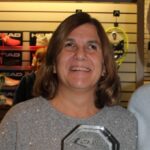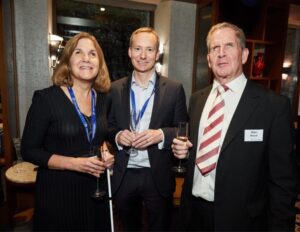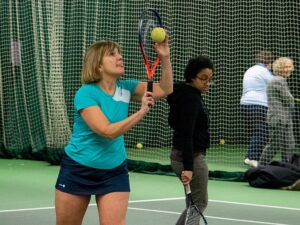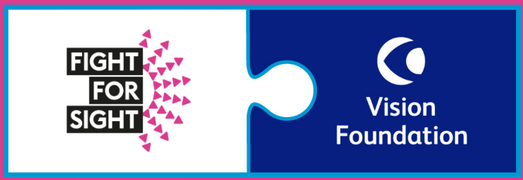 Monica Smith, Fundraising Manager
Monica Smith, Fundraising Manager
My name is Monica and I am a daughter, a mother, a charity fundraiser and a champion tennis player. In addition, I am blind.
Most of us wake up each day and get dressed, have breakfast, make a packed lunch and head off to work. Try imagining doing all these things whilst wearing a blindfold every day for the rest of your life. This is the reality for anyone who has a visual impairment like me. With a little bit of organization and planning everything is possible but our lives would be even more manageable with a change in public attitudes about visual impairment.
Sadly, most people have an outdated and wrongly perceived idea that blind and partially sighted people stay at home all day doing nothing. Would you believe that only six per cent of the public think a blind person could do their job? There probably isn’t any intentional prejudice or discrimination going on here, it’s just that, because employment rates are so low, they have absolutely no idea what is possible. Many of us live fulfilling, independent, busy and active lives, despite being visually impaired.
Please allow me to dispel the myths by giving you an insight into just one day of my life:
6am: Alarm goes off. Bet you’re wondering how on earth I set the thing in the first place, eh? Well, there is an app for smart phones called VoiceOver, which allows someone with a visual impairment to hear aloud whatever is displayed on the screen. In fact, I can also text, check my emails and do my supermarket shopping all on my phone.
6:10am: I get dressed and ready for work. What, on my own? Yes. And I like to pride myself on my appearance. My style is as important to me as anyone else. I use the textures and shapes of the clothes to identify the colour, wishing that when I bought the clothes, I was told the truth about their exact colour in the first place! Also, to make it even easier, there are apps and gadgets for detecting colour.
 6:45am: I leave for work. Aha! Time to use the white stick, yes? Er, actually, no! Thanks to the government’s Access to Work scheme I can get a grant that can pay for things like specialist equipment/assistive technology, a support worker, adaptions or help getting to and from work. And for me I have a taxi waiting to take me to work.
6:45am: I leave for work. Aha! Time to use the white stick, yes? Er, actually, no! Thanks to the government’s Access to Work scheme I can get a grant that can pay for things like specialist equipment/assistive technology, a support worker, adaptions or help getting to and from work. And for me I have a taxi waiting to take me to work.
8:30am – 4:30pm: At work. This is the bit where you get to hear about what 94 percent of the public think I can’t do! Assistive technology is my best friend and has enabled me to keep working ever since I left university. The Access to Work scheme has also provided me with screen-reading technology which reads out the letters and words as I type. It can also read web pages, so that I can navigate those easily. Access to Work also enabled me to have orientation and mobility training before I started my job, so that I was fully equipped to cope with the working environment.
4:30pm: I leave the office to catch the tube to my tennis training session. No, still no white stick! One of my colleagues joins me on the walk to the station and this is where I become a real VIP – or a Visually Impaired Person or Very Important Person, depending on how you look at it! A member of TfL staff accompanies me down to the train and radios through to my destination stop. When I arrive another member of station staff is there to accompany me up to the ticket barrier where tennis volunteers are waiting for me.

6:00: Tennis session Tennis, really?! Blind Tennis is a special game that has been adapted for people like me. Our court is smaller than the usual tennis court and we use noisy balls so we can hear when they’re bouncing. It’s a fantastic couple of hours where I meet friends, exercise and thoroughly enjoy competitive sport.
9pm: I get home and flop on the sofa to watch some TV. I know what you’re thinking; More like radio, surely? Well, many programmes are audio described, which is very useful as it describes what’s going on. Incidentally, Cinemas and theatres also have audio description.
11:00pm: I get into bed and read my book. How? I have the Audible app on my phone which gives me access to a huge range of audiobooks. It is fully accessible with VoiceOver.
Of course, don’t get me wrong I’m not saying that life as a blind person is easy all the time. I have faced my fair share of challenges throughout my life from accessing education, independent mobility and other everyday activities that most sighted people take for granted. I have, however, managed to overcome those hurdles with support from my open-minded family and friends, assistive technology and lots of determination.
I can only hope that by speaking openly about my experiences and educating others, I can break down preconceived ideas about people who are blind or partially sighted. After all, we are just normal people whose eyes don’t work. Or, as one of my tennis friends has printed on his shirt; “I am not disabled, I am differently abled”.
So, please be open-minded and certainly don’t be afraid to ask us how you can help.

